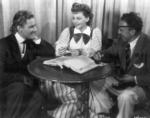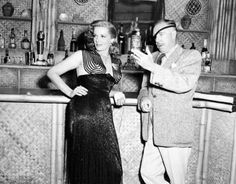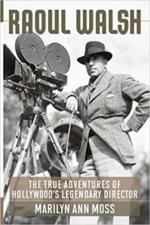“Some men are all right in their place—if they only knew the right places.”
Raoul Walsh is another of those classic directors who perhaps isn’t as well know as he should be. Unlike others, like Michael Curtiz, he doesn’t have a Casablanca or a Mildred Pierce in his arsenal. Rather, he has a lengthy career of excellence ranging from musicals to silents to comedies to westerns. But his forte, even to the end, was action.
It was then with some excitement I cracked (rather belatedly though) Marilyn Moss’ relatively recent biography of the great director. Moss’ challenges with Raoul Walsh are many. Most all of his peers, especially from his formative and even peak Warner Brothers years, are long gone. Walsh left little in terms of papers, diaries and the like. His autobiography, as Moss freely states, is full of so many partial and complete falsehoods that though entertaining it’s unreliable as much of a historical document.
 What we are left with then is a roughly four hundred page wikipedia article. A well written one, but a wikipedia article nonetheless. And that’s not to denigrate Moss, who makes the best of the limited and suspect source material available, but the results are plodding and rather ponderous.
What we are left with then is a roughly four hundred page wikipedia article. A well written one, but a wikipedia article nonetheless. And that’s not to denigrate Moss, who makes the best of the limited and suspect source material available, but the results are plodding and rather ponderous.
Moss provides what she can as to Walsh’s personal life, but it rarely breaks the limit of what you’d call insightful. We learn that he wasn’t really close to any of his adopted children and was a bit of a playboy, but there’s little concrete behind the fluff. One of the most popular tales of Walsh’s life is that shortly after John Barrymore’s death, Walsh stole the body and placed it on Flynn’s couch, eventually scaring the pants off of a (by the time of his return) seriously drunken swashbuckler. Like much of the book, we’re told maybe it’s true or maybe it’s not. No one will ever know. There’s not even much mention of Walsh’s near constant carousing at times with Flynn and company.
The same superficial approach covers Walsh’s directorial style, where we are told numerous time how Walsh would turn his back or otherwise not watch the scene at hand but rather listen to it- sometimes not even doing that. Moss hints at what might have driven this but never presses home any real research to put forth any clues as to what made the man tick.
 And that’s likely the greatest shortfall- the lack of any sense of presenting the facts she does have and proposing common threads which would give a sense of what made the man tick. Did he work just to fund his gambling habit? Or did he truly have a love for his art?
And that’s likely the greatest shortfall- the lack of any sense of presenting the facts she does have and proposing common threads which would give a sense of what made the man tick. Did he work just to fund his gambling habit? Or did he truly have a love for his art?
Art too is a concept that Moss refers to often as a term that Walsh himself avoided after an early “art” film of his bombed with both the critics and the audience. A golden opportunity is missed to tie this together as Walsh – not working and slowly going blind in his remaining eye by this point – suddenly becomes the subject of retrospectives, lectures and reviews of his work, many of which he attended himself to flamboyantly recount the triumphs of his past.
Surely at the end of his career, Walsh must have know that much of what he’d done was art. I guess we’ll never know.
[embedyt] https://www.youtube.com/watch?v=g3ttt0tKAfk[/embedyt]
